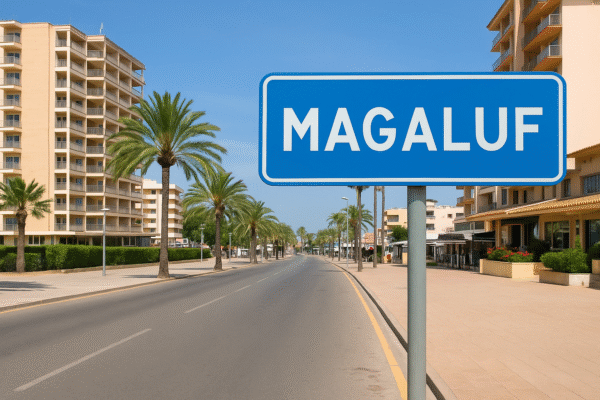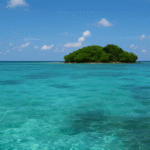Magaluf, Mallorca – Once the emblem of wild nightlife and unrestrained revelry, Magaluf is rewriting its story. Known in the 1990s and 2000s as a magnet for partygoers—particularly British tourists—the coastal resort town is moving away from its reputation as Spain’s premier party capital. Today, local authorities, businesses, and residents are uniting to rebrand Magaluf as a more balanced, family-friendly, and culturally enriched destination.
The Rise and Fall of a Party Town
During its peak years, Magaluf was synonymous with neon lights, packed nightclubs, and streets buzzing until dawn. For many young holidaymakers, especially from the UK, it was the ultimate escape—a place where rules bent to fun, and nightlife ruled the agenda. Tour operators promoted the resort as the go-to destination for clubbing holidays, and thousands flocked to its shores every summer.
But as the years went on, the drawbacks of mass party tourism became harder to ignore. Residents grew weary of rowdy behavior, streets piled up with litter, and alcohol-fueled disturbances overshadowed the town’s natural beauty. What once attracted tourists began to repel families and more discerning travelers. By the mid-2010s, visitor numbers declined, leaving Magaluf with the difficult task of redefining itself in a changing tourism market.
Strict Rules to Restore Order
The most visible signs of Magaluf’s transformation are its strict regulations aimed at curbing excessive drinking and disruptive behavior. Authorities introduced hefty fines—up to €1,500—for drinking alcohol in public spaces. Businesses in certain areas now face nighttime bans on alcohol sales, cutting off the supply that once fueled all-night street parties.
These measures were not simply punitive but part of a broader campaign to restore Magaluf’s reputation as a safe and welcoming holiday destination. Public campaigns stressed respect for local culture, and law enforcement ramped up patrols to ensure compliance. Slowly but steadily, the chaos that once defined Magaluf’s streets began to quiet.
A Shift in Traveler Preferences
Magaluf’s transformation is not solely driven by regulation; it also reflects changing tourist preferences. Today’s travelers—particularly families and younger generations—are increasingly drawn to destinations that combine relaxation, culture, and outdoor experiences. The appetite for loud, alcohol-driven holidays has waned, replaced by a desire for authentic and meaningful travel.
In this sense, Magaluf’s pivot comes at the right time. Mallorca already boasts a wealth of cultural and natural attractions, from historic Palma to the stunning Serra de Tramuntana mountains. By repositioning itself, Magaluf is aligning with broader tourism trends that emphasize wellness, sustainability, and local culture.
Reinventing Magaluf: A New Identity
Local businesses and tourism boards are now working to showcase a different side of Magaluf. The town is promoting family-friendly activities, cultural tours, and outdoor recreation alongside a scaled-back but still vibrant nightlife. New hotels are branding themselves around wellness and relaxation, offering spa services, rooftop terraces, and family-oriented packages.
Water parks, adventure parks, and excursions to explore Mallorca’s countryside are increasingly featured in holiday packages. Restaurants are highlighting Mediterranean cuisine and local gastronomy, a shift from the fast-food culture that once dominated the strip. Even the nightlife that remains is being marketed as more sophisticated, with stylish beach clubs and regulated party cruises replacing the chaotic bar crawls of the past.
Reactions From Visitors
Visitors who return after years away often remark on the striking contrast between the Magaluf of old and today’s calmer atmosphere. Online forums and travel reviews highlight cleaner streets, safer environments, and a broader mix of tourists. Families in particular are noticing the changes, finding Magaluf more welcoming for children and multigenerational travel.
For some, the new Magaluf feels like a loss of the carefree spirit that once defined the town. Yet for many others, it represents a positive step toward balance—preserving elements of nightlife while shedding the unruly extremes.
Economic and Community Impact
The town’s rebranding has also had economic implications. While visitor numbers initially dipped as Magaluf distanced itself from its party-town identity, the long-term goal is to attract a more diverse mix of travelers who stay longer and spend more across a variety of sectors. Local communities are already benefiting from a cleaner environment and a more stable flow of tourism income.
By focusing on quality over quantity, Magaluf is seeking a tourism model that is sustainable for both residents and the environment. Authorities hope this will ensure the town remains competitive in Spain’s highly saturated holiday market.
Looking Ahead: A Balanced Destination
The coming years will be critical for Magaluf’s revival. Investments in infrastructure, cultural programming, and sustainable tourism practices are expected to support the town’s new identity. Authorities remain committed to enforcing regulations while supporting businesses that align with this vision.
Magaluf’s challenge lies in striking the right balance—retaining enough nightlife to attract younger travelers while making the town appealing to families, couples, and culture seekers. If successful, it could emerge as a well-rounded destination that combines sun, sea, culture, and entertainment without the excesses of its past.
Conclusion
The days of Magaluf’s non-stop party scene are fading into history. In their place, a more mature, diverse, and sustainable tourism model is taking shape. With strict regulations, evolving tourist preferences, and renewed investment in culture and family-friendly activities, Magaluf is determined to reinvent itself for a new era.
For travelers, this means a chance to rediscover the resort in a different light—one that promises relaxation, safety, and authenticity alongside just enough nightlife to keep the spirit of fun alive.
For more travel news like this, keep reading Global Travel Wire

















